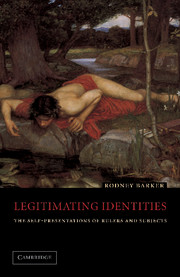3 - King John's Christmas cards: self-legitimation
Published online by Cambridge University Press: 22 September 2009
Summary
King John was not a good man,
And no good friends had he.
He stayed in every afternoon …
But no one came to tea.
And, round about December,
The cards upon his shelf
Which wished him lots of Christmas cheer,
And fortune in the coming year,
Were never from his near and dear,
But only from himself.
A. A. Milne's King John provides a metaphor, if an exaggerated one, for the self-legitimation of government. In addition to the picture of legitimation frequently presented, as the means whereby subjects and, ideally, subjects in a democracy, authorise government, or rulers gain the consent of the ruled, legitimation is also an activity carried on by rulers for their own benefit, by the state for and from itself. Legitimation is not only a circus for the mass of subjects, but also a private theatre for rulers, where they see their own identity portrayed, confirmed, and justified. The near and dear, inasmuch as they are part of the community of rulers, will send cards, but nobody else will. The larger part of the population will not even know that the ceremonies are occurring. Rulers appear to need to legitimate their power, to demonstrate constantly by rituals both spiritual and secular their unique prestige, as persons authorised in a manner that ordinary subjects are not, as persons set apart to exercise the powers and privileges of government.
- Type
- Chapter
- Information
- Legitimating IdentitiesThe Self-Presentations of Rulers and Subjects, pp. 41 - 69Publisher: Cambridge University PressPrint publication year: 2001



